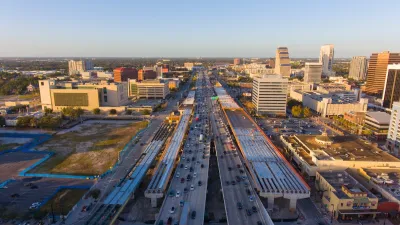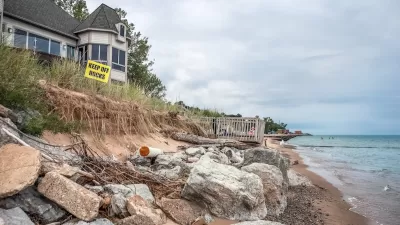In addition to displacement and public health impacts, highway expansions can also make communities less resilient to flooding and other climate-related disasters.

In a blog post for Transportation for America, Mehr Mukhtar describes how the U.S. Interstate Highway System has negatively impacted communities. “These legacies are not abstract; they have tangible effects in terms of pollution, population displacement, and environmental degradation,” Mukhtar writes.
To illustrate the point, Mukhtar uses the case of Shiloh, Alabama, a predominantly Black rural community where the expansion of a local highway led to increased flooding impacts. “Flooding has affected the structural integrity of homes and is raising alarming health concerns with residents reporting the appearance of mold. Physical damages and rising maintenance issues have forced the Shiloh community to contend with the difficult reality of investing in expensive repair projects or leaving their homes.”
Shiloh, like other communities, has been fighting for recognition and resources using tools like the National Environmental Policy Act (NEPA). In the case of Shiloh, “Their efforts culminated in an ongoing civil rights investigation from the Federal Highway Administration (FHWA) and a visit from the U.S. Secretary of Transportation Pete Buttigieg in early April of this year. But so far, no real relief has been found.”
Now, funding from programs like Reconnecting Communities must be used strategically to begin redressing historical harms. According to Mukhtar, “Funding is being moved towards emissions-increasing roadway widenings at a critical moment in the climate crisis when our dollars should be spent towards robust public and alternative transportation options. Our transportation system is steeped in environmental racism and continues to function as a driver of inequality.”
FULL STORY: There’s a climate cost to America’s freeways, and it’s not paid equally

Maui's Vacation Rental Debate Turns Ugly
Verbal attacks, misinformation campaigns and fistfights plague a high-stakes debate to convert thousands of vacation rentals into long-term housing.

Planetizen Federal Action Tracker
A weekly monitor of how Trump’s orders and actions are impacting planners and planning in America.

In Urban Planning, AI Prompting Could be the New Design Thinking
Creativity has long been key to great urban design. What if we see AI as our new creative partner?

How the ‘Big Beautiful Bill’ Impacts Transportation
Five ways the bill negatively impacts U.S. transportation policy.

California Creates Housing-Focused Agency
Previously, the state’s housing and homelessness programs fell under a grabbag department that also regulates the alcohol industry, car mechanics, and horse racing.

Chicago’s Ghost Rails
Just beneath the surface of the modern city lie the remnants of its expansive early 20th-century streetcar system.
Urban Design for Planners 1: Software Tools
This six-course series explores essential urban design concepts using open source software and equips planners with the tools they need to participate fully in the urban design process.
Planning for Universal Design
Learn the tools for implementing Universal Design in planning regulations.
planning NEXT
Appalachian Highlands Housing Partners
Mpact (founded as Rail~Volution)
City of Camden Redevelopment Agency
City of Astoria
City of Portland
City of Laramie





























